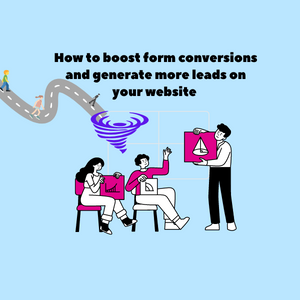- Benefits of Integrating Your Website with CRM to Streamline Your Business
- What is a CRM for Ecommerce Website?
- The Imperative Need for CRM Integration with Website
- Unleashing the Power of CRM Integration for Business Optimization: Advantages of having a CRM
- Why Zoho CRM Stands Out
- What’s Next?
- Do eCommerce sites need CRM?
- How do I integrate Zoho CRM with my website?
- Do I need a CRM if I have a website?
Benefits of Integrating Your Website with CRM to Streamline Your Business
Facebook Youtube LinkedinIn the fast-paced world of eCommerce, delivering exceptional customer experiences is paramount to success. With consumers increasingly turning to online channels for their shopping needs, businesses must adapt and evolve their strategies to meet changing demands. One strategy that has gained widespread adoption is the integration of CRM software with eCommerce websites. But what exactly is CRM, and why is it essential for eCommerce websites?
What is a CRM for Ecommerce Website?

CRM, or Customer Relationship Management, refers to a set of practices, strategies, and technologies that businesses use to manage and analyze customer interactions throughout the customer lifecycle. In the context of eCommerce websites, CRM software enables businesses to capture, store, and analyze customer data, including contact information, purchase history, and preferences. By centralizing this data, businesses can gain valuable insights into customer behavior and tailor their marketing and sales efforts accordingly.
The Imperative Need for CRM Integration with Website
In today's competitive landscape, eCommerce businesses face numerous challenges, from attracting and retaining customers to managing inventory and logistics. Without a robust CRM system in place, businesses may struggle to keep up with customer demands and maintain a competitive edge. That's where Website integration with CRM comes in. By seamlessly integrating CRM with your eCommerce website, you can streamline processes, automate tasks, and deliver personalized experiences that drive customer loyalty and revenue.
Unleashing the Power of CRM Integration for Business Optimization: Advantages of having a CRM
Implementing Customer Relationship Management (CRM) software into your business operations can yield a multitude of benefits, particularly when integrated seamlessly with your website. Let's delve into some of the significant advantages that come with this integration:
Enhanced Customer Insights: By integrating CRM with your website, you gain valuable insights into customer behavior, preferences, and interactions. This data allows you to tailor your marketing strategies, product offerings, and customer service initiatives to better meet the needs and expectations of your target audience.
Improved Lead Management: CRM integration with website enables you to capture leads directly from your website and track them throughout the sales pipeline. With centralized lead management, you can prioritize leads, automate follow-up processes, and ensure timely engagement with potential customers, ultimately leading to higher conversion rates and increased revenue.
Streamlined Communication: Integrating CRM with your website facilitates seamless communication between your sales, marketing, and customer support teams. Whether it's capturing inquiries from website forms, responding to customer queries, or tracking customer interactions across multiple channels, CRM ensures that all team members have access to up-to-date information, fostering collaboration and efficiency.
Personalized Customer Experiences: With CRM integration, you can deliver personalized experiences to website visitors based on their past interactions and preferences. By leveraging customer data stored in the CRM system, you can create targeted marketing campaigns, recommend relevant products or services, and provide customized support, enhancing overall customer satisfaction and loyalty.
Data-driven Decision Making: By centralizing customer data from your website and other touchpoints within the CRM system, you gain actionable insights that drive informed decision-making. Whether it's identifying trends, forecasting sales opportunities, or evaluating marketing campaign performance, CRM empowers you to make data-driven decisions that optimize business outcomes.
Why Zoho CRM Stands Out

When it comes to choosing a CRM solution for your Ecommerce business, Zoho CRM stands out as a top contender. Zoho is one of the veteran software companies working in the CRM industry and has revolutionized it.
Here are some of the reason why Zoho stands out as one of the best CRMs for Ecommerce businesses:
Comprehensive Feature Set: Zoho CRM offers a comprehensive suite of features designed to meet the diverse needs of businesses across industries. From lead management and sales automation to marketing automation and customer support, Zoho CRM provides a robust set of tools to streamline your business processes and drive growth.
User-friendly Interface: Zoho CRM boasts an intuitive and user-friendly interface that makes it easy for users to navigate and utilize its features effectively. Whether you're a sales representative, marketing manager, or customer support agent, Zoho CRM's interface is designed to enhance productivity and efficiency, minimizing the learning curve for new users.
Customization Options: Zoho CRM offers extensive customization options that allow you to tailor the platform to suit your unique business requirements. From customizing data fields and workflows to creating personalized dashboards and reports, Zoho CRM empowers you to adapt the system to your specific needs, ensuring maximum flexibility and scalability.
Integration Capabilities: Zoho CRM seamlessly integrates with a wide range of third-party applications and services, allowing you to extend its functionality and integrate it with your existing tools and systems. Whether you need to integrate with email marketing platforms, e-commerce solutions, or accounting software, Zoho CRM offers seamless integration options that enhance its utility and value.
Affordable Pricing: Zoho CRM offers flexible pricing plans that cater to businesses of all sizes and budgets. Whether you're a small startup or a large enterprise, Zoho CRM's pricing options are designed to accommodate your needs without breaking the bank. With affordable subscription plans and transparent pricing, Zoho CRM delivers exceptional value for money.
What’s Next?
Now that you understand the importance of integrating CRM with your website and why Zoho CRM stands out as a top choice, it's time to take the next step in optimizing your business operations.
Implementing CRM correctly is one of the tasks that should be left to Experts, If you’re choosing Zoho as your CRM then you should definitely checkout us out - Customerization, as a certified Zoho CRM premium partner, we can help you seamlessly implement Zoho CRM into your website and unlock its full potential.
We have worked with Hundreds of SMBs across Canada and US for the past years and successfully implemented CRM to each of their businesses' success.
In conclusion, Integrating your website with CRM is a strategic investment that can yield significant returns in terms of efficiency, productivity, and customer satisfaction. With the right CRM solution and implementation partner, you can unlock the full potential of CRM and propel your business towards success.
More About Zoho CRM Consulting Services Contact UsDo eCommerce sites need CRM?
Yes, eCommerce sites can benefit significantly from CRM integration, as it enables them to manage customer relationships, track sales data, and personalize marketing efforts to drive conversions and retention.
How do I integrate Zoho CRM with my website?
Integrating Zoho CRM with your website can be done using various methods, including API integration, webhooks, or third-party plugins/extensions. Customerization can assist you in selecting the most suitable integration method and ensuring a smooth implementation process.
Do I need a CRM if I have a website?
While having a website is essential for establishing an online presence, integrating CRM with your website can further enhance its functionality by enabling you to capture leads, track customer interactions, and streamline business processes, ultimately leading to improved efficiency and profitability.





